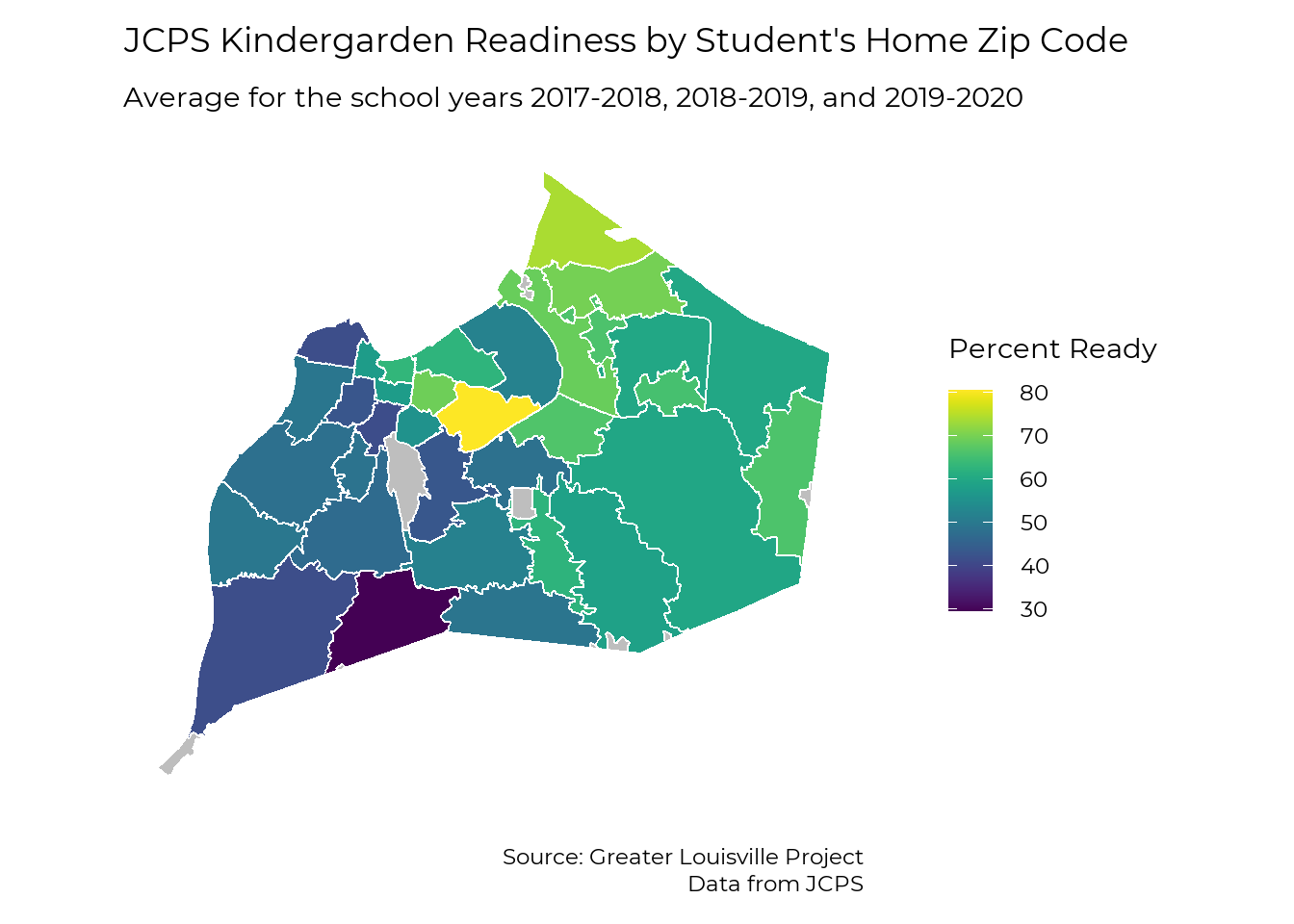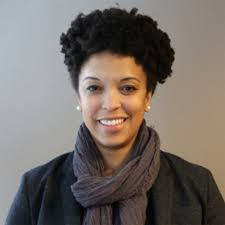Kindergarten Readiness is a Community Effort
April 28, 2021As a community, we are fortunate to be part of a city that is data-focused and informed. We are grateful to the Greater Louisville Project for helping us better understand the realities, successes, and needs of the youngest in our community. But as we look at the data— specifically JCPS kindergarten readiness by students’ home zip code—we see an all too familiar story here in Jefferson County. Discouragingly, the map below could easily be replaced with a map reflecting the population living in poverty, number of evictions and foreclosures, residential utility disconnection rates, lead poisoning, and most troubling, life expectancy and we would see the same trends in west and south Louisville.
Parts of our city are in crisis, and COVID-19 is not only shining a light on these issues but exacerbating them.
Assessment data from the 2019-2020 academic year reveal that only 50% of Black JCPS students and 33% of Hispanic JCPS students were ready for kindergarten. It should also be noted that only 57% of White (non-Hispanic) students were kindergarten ready. The most significant disparities by race and class occur based on the prior setting of the student (e.g., child care, Head Start, public pre-k, or home). Of all prior settings, “home” is one of the most common environments in which rising kindergarteners are educated, but the home setting is also where Black (29% k-ready) and Hispanic (17% k-ready) students have the most significant learning gaps.
We’ve been able to measure it. Now how are we going to improve it? First, some straight-forward solutions are on the table now. We know that children in formal settings show up to kindergarten ready to learn more often than their peers. So, creating a system where more children can be served in formal
care will help increase overall readiness rates. To do this, we are advocating at the state level for:
- Increasing funding for state funded preschool and the Child Care Assistance Program (CCAP)
- Increasing income eligibility for state funded preschool and CCAP to 200% of the federal poverty level
- Join us in this work by asking your legislators to make urgent investments in child care here.
But as we know from the data, serving more children in formal settings is not enough. It is unacceptable that kindergarten readiness in Jefferson County can essentially be predicted based on the intersection of race and economic status. Children not in a formal setting before kindergarten are the most likely to show up unready, and therefore, are exactly the children and families who we need to reach the most. This is where things are more complicated. How and where do we reach families and children who are not in a formal setting?
While child care centers, Head Start, and public pre-k programs are able to provide curricula in alignment with the Brigance (the assessment most utilized to determine kindergarten readiness), the same information and curricula are not shared with many families educating their young learners at
home. They often believe that their children are ready for kindergarten when they start their first day of school–not knowing that other kindergarteners who were enrolled in public pre-k, child care centers or Head Start had access to the proverbial playbook.
To make a real difference in children’s outcomes this proverbial playbook should be, and needs to be, everywhere—the grocery store, library, barber shop, bus stop, pediatrician’s office, science museum, and zoo. Anywhere and everywhere families are, that is where we as a community need to be with a consistent message, resources, and wrap-around services that lift families and guarantee children can thrive on their first day of school.
This is why we need all partners at the table. No one organization can do this work alone and expect to make meaningful progress in the outcomes of the children in our community. We need a community-wide coordinated effort saturating our community with information, resources, and support on the
importance of kindergarten readiness and ensuring every child shows up to kindergarten ready to learn. So, no matter where children are in their first five years, they and their families know what it means to be kindergarten ready and have the resources and supports to make it a reality.
Additionally, there is a dire need to redefine what it means to be kindergarten-ready and increase culturally relevant curricula and assessments. When a child’s culture is not valued as a foundational and essential component of kindergarten readiness, significant elements are not factored into academic
preparation. If we ever hope to close the achievement gap, we must first address the communication and cultural appreciation gaps.
To achieve these goals, we invite you to join the Ready for K Alliance. The Ready for K Alliance is an initiative of community partners united in the vision that all children enter kindergarten ready to thrive and dedicated to the work of dramatically improving kindergarten readiness. The Alliance identifies
what strategies are advancing outcomes for children in our community and works to highlight and scale those strategies. The Ready for K Alliance focuses on the critical milestones children reach between birth and 5 years old, and views helping children reach those milestones as a collective effort. Building greater community awareness of the importance of kindergarten readiness and the roles that every individual and organization can play in improving children’s outcomes are key first steps. Together, we must be willing to raise up the success of our children as a priority and recognize that families and schools alone cannot ensure every opportunity needed for readiness. It is up to all of us.
We are asking our community to make Jefferson County a leader in early childhood success. We encourage all members of the Louisville community to join the Ready for K Alliance in advocating for and working toward the success of our youngest children as they shape their future and the future of our
community.
JOIN US FOR A COMMUNITY CONVERSATION ON EARLY CHILDHOOD
Tuesday, May 4, 2021 from noon o 1:30 p.m.
GUEST WRITERS
Kish Cumi Price, PhD, is the Director of Education Policy and Programming at the Louisville
Urban League where she embraces a distinct call to fight for educational and social justice
for youth and their families. She has served in schools and communities largely representing
minoritized populations as an executive director of an integrated health care pediatric office,
elementary school counselor, CEO of a mentoring/tutoring program for middle school
students, a clinical mental health counselor for high school students, and a researcher and
counselor educator. Most importantly, she is a proud wife and mom of 10 children (4 bio
and 6 bonus) focused on establishing a legacy of love.

Ashley Brandt, MBA is the Senior Manager of Early Care and Education at Metro United Way
where she works to improve outcomes and increase kindergarten readiness for children in
our community. She has over fifteen years of experience in early childhood, including eight
years as an early childhood educator. Outside of work, Ashley enjoys travelling and spending
time with her dog Peanut.


